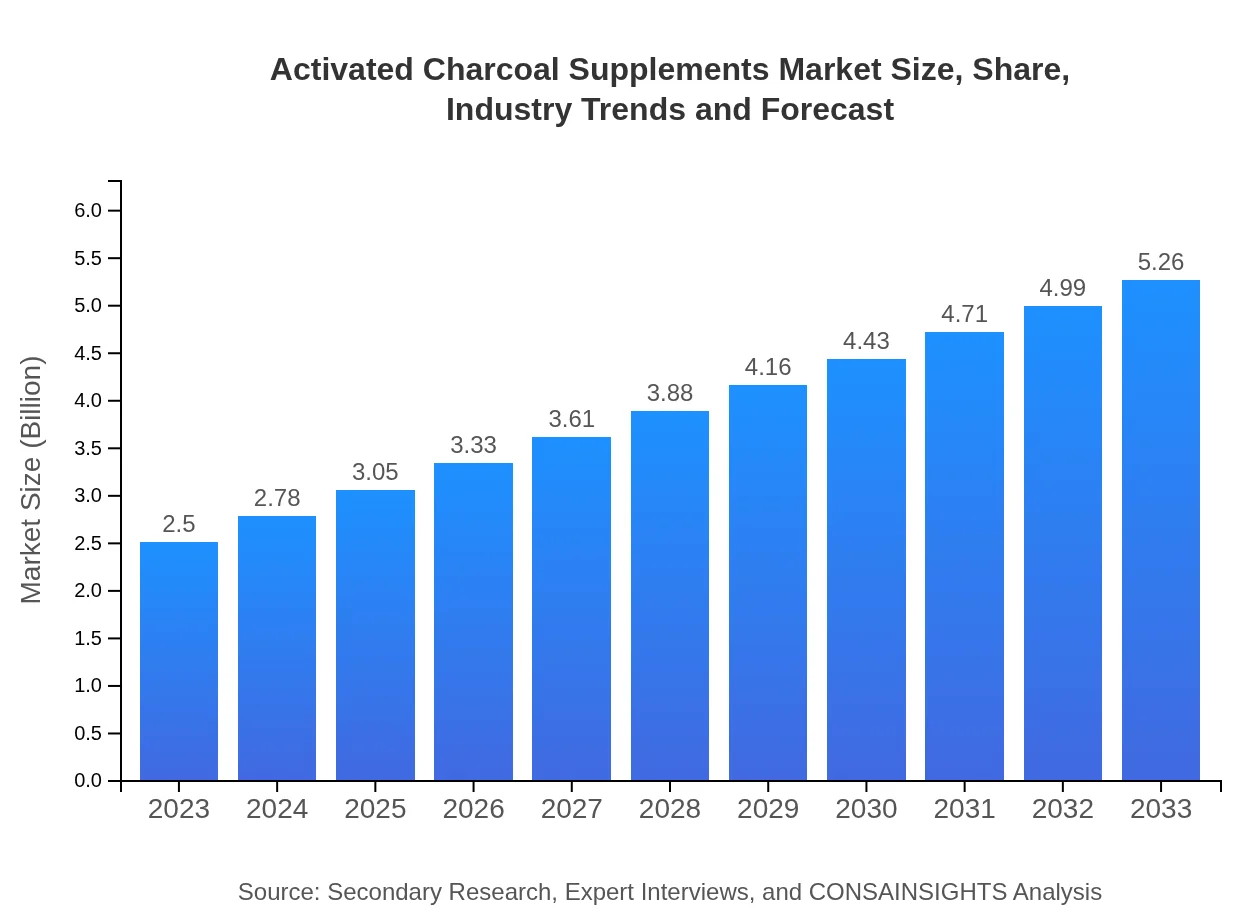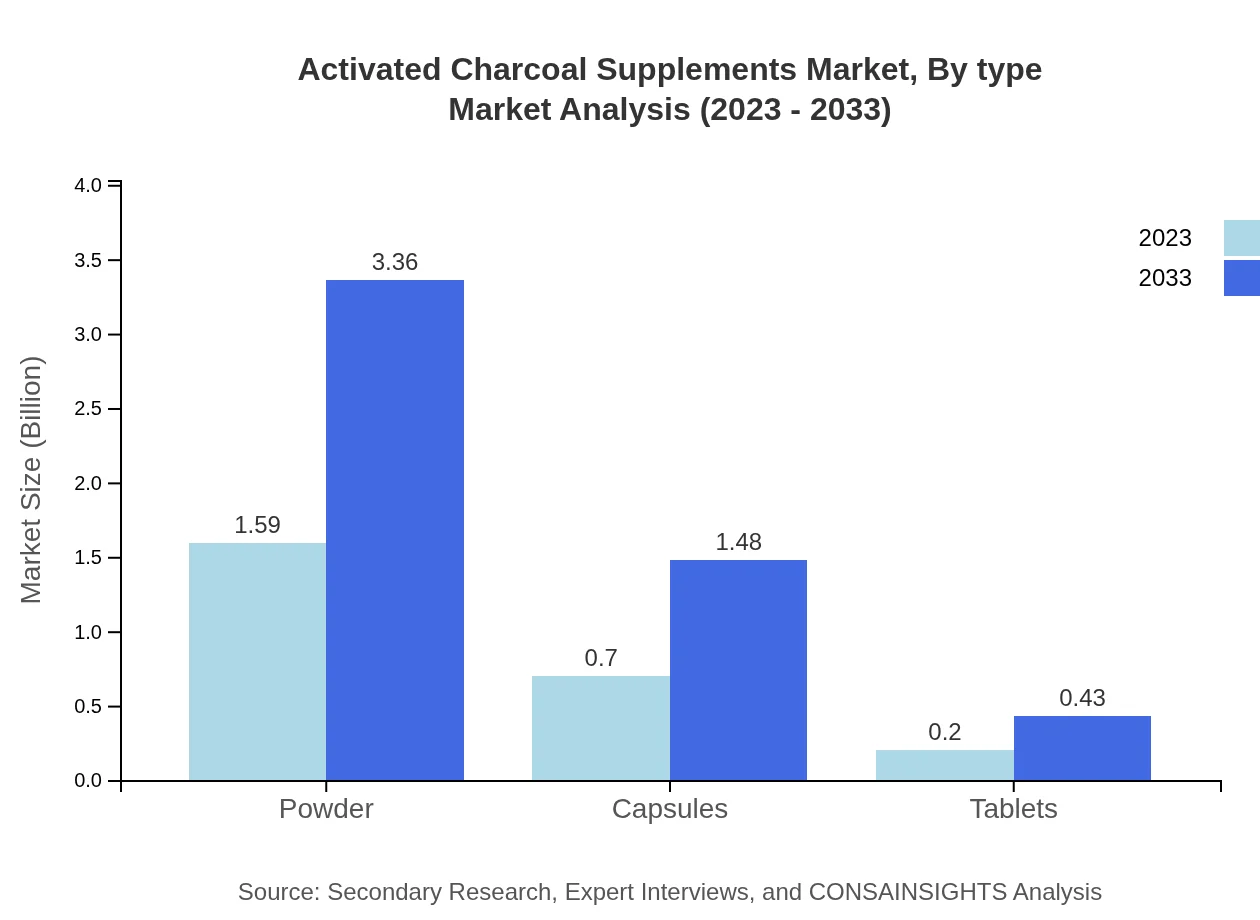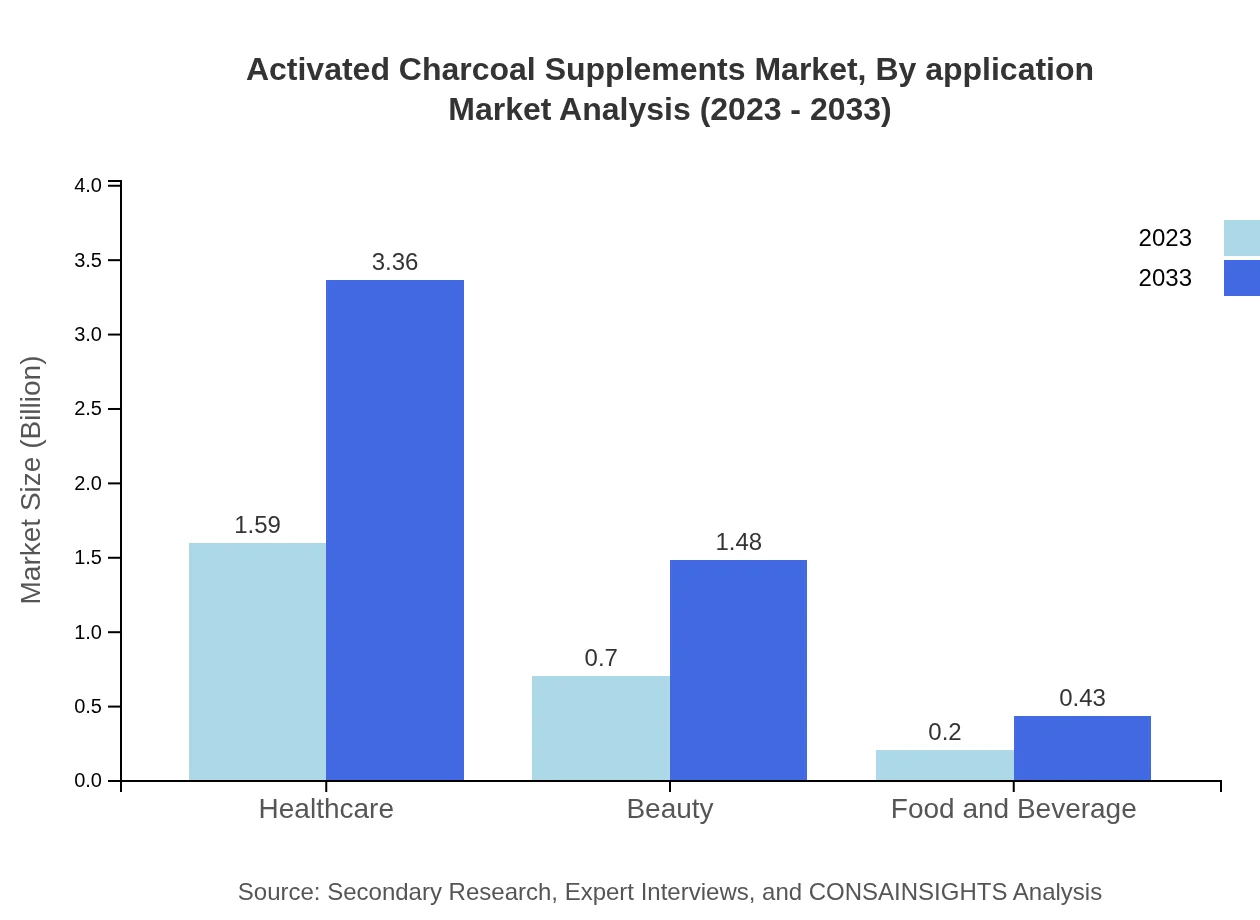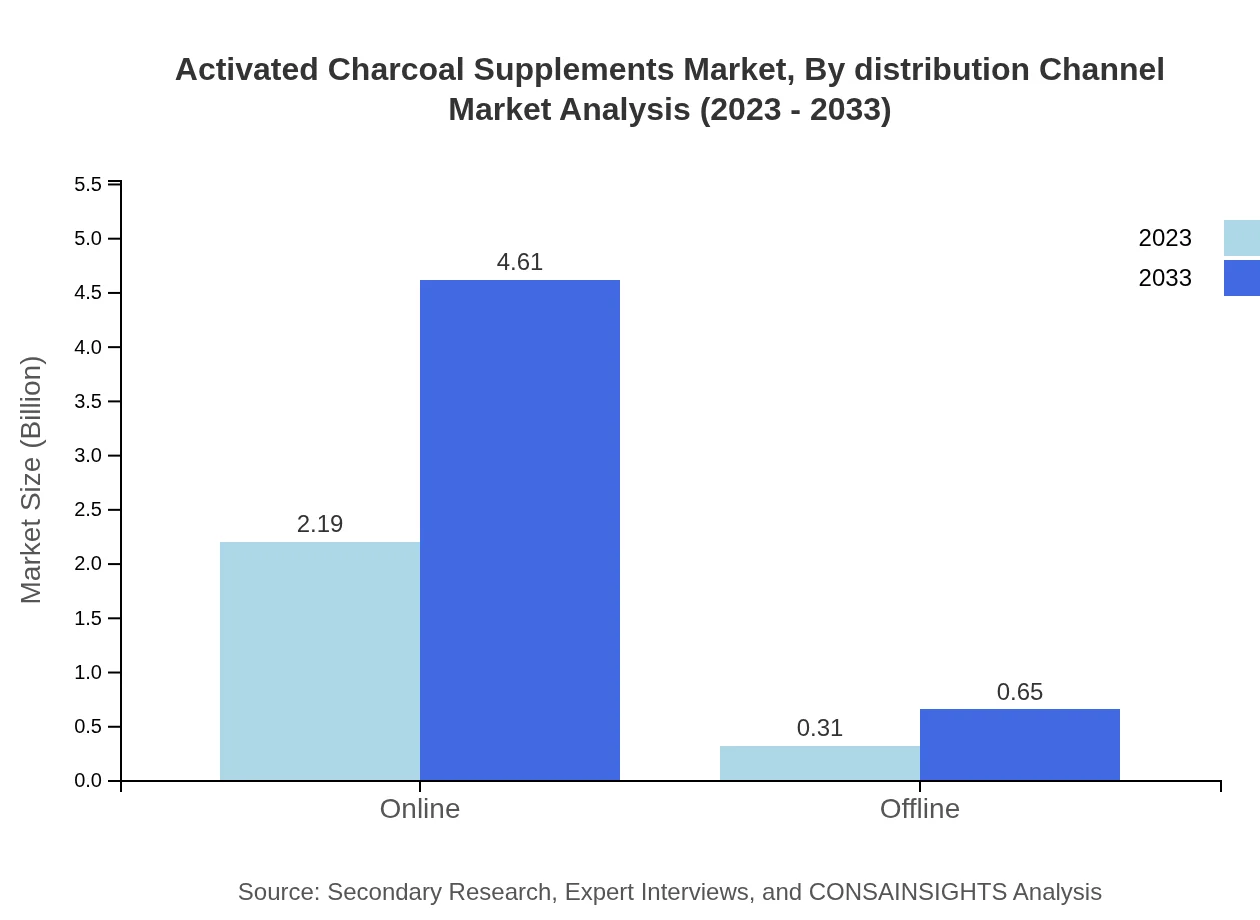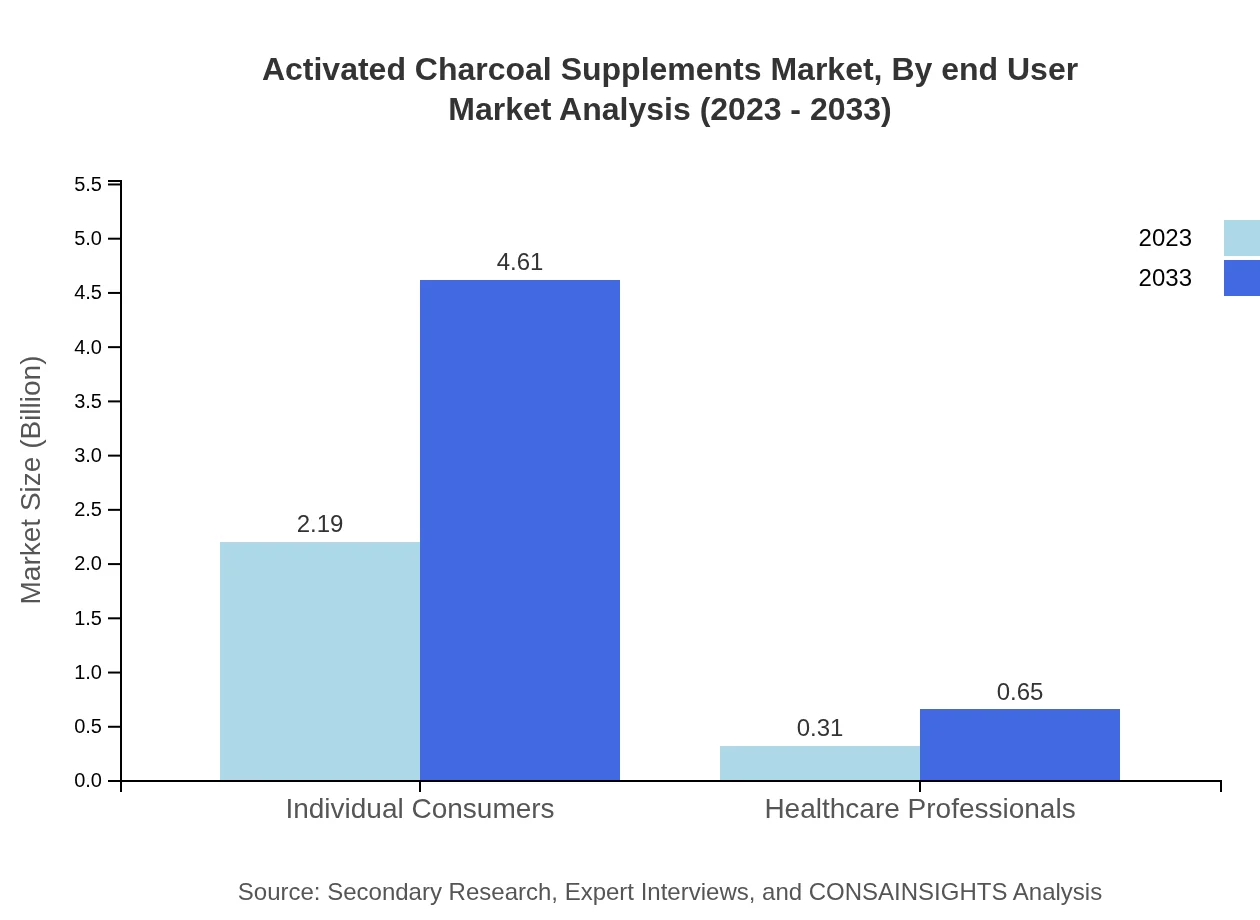Activated Charcoal Supplements Market Report
Published Date: 31 January 2026 | Report Code: activated-charcoal-supplements
Activated Charcoal Supplements Market Size, Share, Industry Trends and Forecast to 2033
This report provides an in-depth analysis of the Activated Charcoal Supplements market, covering its current status, size, trends, and forecasts from 2023 to 2033. It includes insights on segmentation, regional analysis, technology advancements, and leading companies in the industry.
| Metric | Value |
|---|---|
| Study Period | 2023 - 2033 |
| 2023 Market Size | $2.50 Billion |
| CAGR (2023-2033) | 7.5% |
| 2033 Market Size | $5.26 Billion |
| Top Companies | Health Cares, Activated Charcoal Company, NutraBlast, Zen Charcoal |
| Last Modified Date | 31 January 2026 |
Activated Charcoal Supplements Market Overview
Customize Activated Charcoal Supplements Market Report market research report
- ✔ Get in-depth analysis of Activated Charcoal Supplements market size, growth, and forecasts.
- ✔ Understand Activated Charcoal Supplements's regional dynamics and industry-specific trends.
- ✔ Identify potential applications, end-user demand, and growth segments in Activated Charcoal Supplements
What is the Market Size & CAGR of Activated Charcoal Supplements market in 2023?
Activated Charcoal Supplements Industry Analysis
Activated Charcoal Supplements Market Segmentation and Scope
Tell us your focus area and get a customized research report.
Activated Charcoal Supplements Market Analysis Report by Region
Europe Activated Charcoal Supplements Market Report:
The European market is estimated to increase from USD 0.66 billion in 2023 to USD 1.38 billion in 2033. The trend of incorporating activated charcoal into beauty and health products is a key growth driver, with countries like Germany and the UK seeing substantial sales growth due to health trends and lifestyle changes.Asia Pacific Activated Charcoal Supplements Market Report:
The Asia Pacific region is seeing a significant increase in market size from USD 0.51 billion in 2023 to USD 1.08 billion in 2033, largely due to the growing consumer shift towards health and wellness and the increasing availability of activated charcoal products. The trend is particularly robust in China and India, where rising disposable incomes support spending on health supplements.North America Activated Charcoal Supplements Market Report:
North America, showcasing a robust market, is projected to grow from USD 0.80 billion in 2023 to USD 1.69 billion in 2033. The region is witnessing rising consumer awareness about detoxification and gut health. The diverse range of products available in this region, along with high marketing efforts by brands, contributes significantly to this growth.South America Activated Charcoal Supplements Market Report:
In South America, the market is expected to grow from USD 0.22 billion in 2023 to USD 0.47 billion by 2033. Increased awareness about natural health products and growing fitness trends are major factors driving this growth. Countries like Brazil and Argentina are poised to lead in demand for activated charcoal supplements.Middle East & Africa Activated Charcoal Supplements Market Report:
The market in the Middle East and Africa is forecasted to grow from USD 0.30 billion in 2023 to USD 0.64 billion in 2033, supported by health trends in larger urbanized areas. Consumers are beginning to adopt activated charcoal supplements as part of their wellness habits, particularly in sectors like personal care and detoxification.Tell us your focus area and get a customized research report.
Activated Charcoal Supplements Market Analysis By Type
In 2023, the powder segment is leading with a market size of USD 1.59 billion, expected to reach USD 3.36 billion by 2033, holding 63.75% market share. Capsules follow with a size of USD 0.70 billion in 2023, projected to grow to USD 1.48 billion, securing a 28.15% share. Tablets, while smaller in size at USD 0.20 billion, are expected to grow to USD 0.43 billion, making up 8.1% of the market.
Activated Charcoal Supplements Market Analysis By Application
The application segmentation shows Health Care leading with a market size of USD 1.59 billion in 2023 and expected to grow to USD 3.36 billion by 2033, comprising 63.75%. Beauty applications also grow significantly, from USD 0.70 billion to USD 1.48 billion. Other applications, though smaller in size, such as Food and Beverage, are critical for market diversification and reach.
Activated Charcoal Supplements Market Analysis By Distribution Channel
Online sales dominate the distribution channel landscape, accounting for USD 2.19 billion in 2023 and projected to expand to USD 4.61 billion, capturing 87.61% of the total market share. Offline sales, including retail and health stores, show steadier but slower growth, from USD 0.31 billion to USD 0.65 billion, capturing 12.39%.
Activated Charcoal Supplements Market Analysis By End User
Individual consumers comprise the largest group, sized at USD 2.19 billion in 2023 and anticipated to grow to USD 4.61 billion by 2033, holding the bulk 87.61% share. Healthcare professionals represent a smaller but noteworthy segment, growing from USD 0.31 billion to USD 0.65 billion, reflecting the increasing incorporation of activated charcoal in professional wellness advice.
Activated Charcoal Supplements Market Trends and Future Forecast
Tell us your focus area and get a customized research report.
Global Market Leaders and Top Companies in Activated Charcoal Supplements Industry
Health Cares:
A leading producer of health supplements specializing in activated charcoal products, known for their rigorous safety and quality protocols.Activated Charcoal Company:
A well-recognized brand producing a range of activated charcoal supplements, focusing on innovative formulations to meet consumer demands.NutraBlast:
A prominent player in the health supplement market with a strong portfolio of natural products including activated charcoal capsules and powders.Zen Charcoal:
An emerging brand that leverages e-commerce to directly reach the consumer market, offering a diverse mix of high-quality activated charcoal products.We're grateful to work with incredible clients.









FAQs
What is the market size of activated Charcoal Supplements?
The global activated charcoal supplements market is projected to grow from a base market size of $2.5 billion in 2023 to an estimated value in 2033. The market is expected to witness a compound annual growth rate (CAGR) of 7.5% over the forecast period.
What are the key market players or companies in this activated Charcoal Supplements industry?
Key players in the activated charcoal supplements market include major dietary supplement brands, herbal product companies, and health-focused startups. Each company aims to provide unique formulations that enhance health benefits associated with activated charcoal.
What are the primary factors driving the growth in the activated Charcoal Supplements industry?
Growth in the activated charcoal supplements market is driven by increased consumer awareness of health benefits, a rising trend in detoxification, and an expanding dietary supplement market. Additionally, innovations in product delivery forms attract a broader consumer base.
Which region is the fastest Growing in the activated Charcoal Supplements?
Among the regions, Europe is projected to show significant growth, expanding its market size from $0.66 billion in 2023 to $1.38 billion by 2033. North America also experiences noteworthy growth, with projections from $0.80 billion to $1.69 billion.
Does ConsaInsights provide customized market report data for the activated Charcoal Supplements industry?
Yes, ConsaInsights offers customized market report data tailored to clients' specific needs in the activated charcoal supplements industry. This includes detailed analysis, regional insights, and segment-specific data to support informed decision-making.
What deliverables can I expect from this activated Charcoal Supplements market research project?
Clients can expect comprehensive deliverables including detailed market analysis, trend reports, competitive landscape insights, and forecasts based on various segments to guide strategic decisions in the activated charcoal supplements sector.
What are the market trends of activated Charcoal Supplements?
Current market trends show an increasing shift towards natural and organic supplements, heightened interest in detox products, and an expanding consumer base that prioritizes wellness. These trends contribute to the growing market and influence product development strategies.

